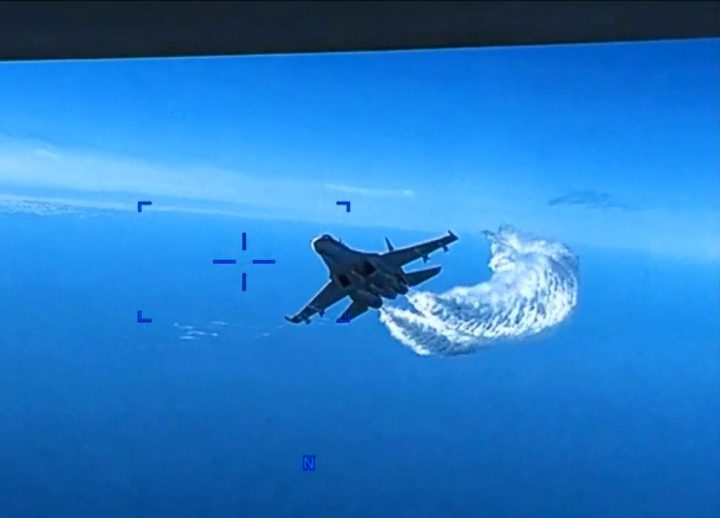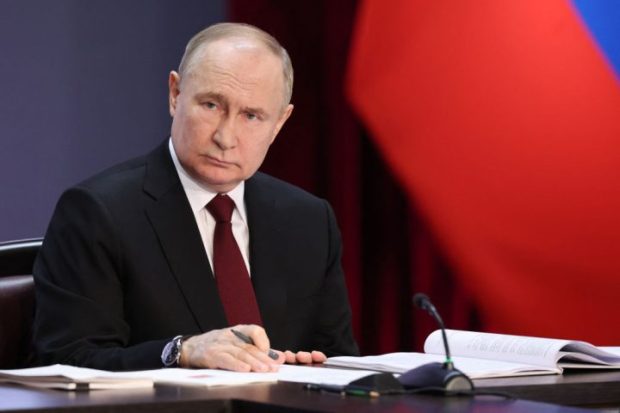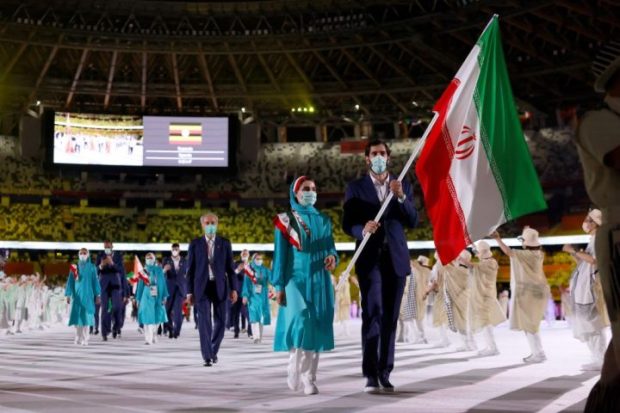Earlier this month, an unarmed Polish aircraft monitoring potential human smuggling and illegal fishing on the Black Sea almost ditched into the sea when a Russian Su-35 fighter engaged it over international waters. It was a reminder that while attention is inevitably focused on the land battles anticipated when Kyiv launches its spring counter-offensive, this is also a war playing out at sea. It was also a reminder that what happens offshore has far wider implications.
The twin-engine L-410 Turbolet, more commonly used as a small commuter aircraft, was being used by Frontex, the European Union’s border security agency, as part of its Western Black Sea 2023 operation. It was a routine flight, and unlike the American MQ-9 Reaper drone downed in March, offered no conceivable threat to Russian forces. Nonetheless, the Su-35 performed what the Romanian defence ministry called ‘aggressive and dangerous’ manoeuvres that almost made it lose control, driving it back to Romania’s Mihail Kogălniceanu Airport.
What happens at sea doesn’t stay at sea, and its waves lap across the globe
No one was hurt this time, but four Nato fighters were being readied to respond: this could have become much nastier, very quickly. Indeed, a day after the Polish aircraft incident, an RAF Boeing RC-135 Rivet Joint electronic reconnaissance aircraft was spotted heading into the Black Sea from the Romanian coast.
This is the same kind of aircraft almost shot down in September, when a Russian pilot accidentally launched a missile that fortunately didn’t arm. Since then, French, Italian and Turkish reconnaissance aircraft have all been active over the western Black Sea. In many ways, this is the real front line between Nato and Russia.
Three months before Moscow’s invasion of Ukraine, I was co-author of a report from the Council on Geostrategy that warned that ‘the Black Sea region is at risk of becoming an anarchic environment where insecurity reigns amid Russian domination’. There is no satisfaction is being proven right.
Russian ships and missiles threaten civil shipping including, until a temporary agreement was brokered by the UN, crucial grain exports to Europe, Africa and the Middle East. Russian Black Sea Fleet ships launch cruise missiles at civilian targets on the coast and far beyond. Crimea is both a platform for Russian strikes and a target for Ukrainian air and sea attacks in return.
The political future of Crimea is a complex question. But as long as it remains not just Russian but heavily militarised, the Black Sea will continue to be subject to Moscow’s will and capacity to threaten and interdict.
This is one reason why, before the invasion, the Royal Navy and other Nato fleets made a point of mounting FONOPs – Freedom of Navigation Operations – through waters Moscow illegally claimed. Not to have challenged Russia’s ‘sea grab’ would have implicitly have been to accept it. This would not only have taken the Black Sea closer to becoming a Russian lake, it also could have emboldened Beijing further in its efforts to claim more of the South China Sea, again in contravention of international law.
So what? What happens at sea doesn’t stay at sea, and its waves lap across the globe. Some 90 per cent of traded goods move by sea, linking every country together in a web of direct and indirect interdependence.
War in the Black Sea generates instability in global commodities markets and hunger in impoverished corners of the world, for example. Despite the grain deal (which is soon due to expire, and which Moscow could well choose not to renew) and the EU’s overland ‘solidarity lane’ routes, it has affected global prices of everything from sunflower oil to maize.
Prices later stabilised, albeit at still higher levels, but in the immediate aftermath of the invasion, wheat futures leapt almost 60 per cent and a range of other goods and foodstuffs suddenly became scarce. In response, some countries banned exports of certain commodities to conserve their own supplies. India temporarily barred exports of wheat, for instance, and Indonesia of palm oil. All this contributed to rising food prices across the world, and especially to a jump in outright hunger in places such as the Horn of Africa.
This highlights the complex nature of maritime security in the modern age. Russian ships and mini-submarines are reportedly mapping European power and internet cables and gas pipelines, with a potential eye to sabotage. China deploys its so-called ‘little blue men’, maritime militia, coastguards and even armed fishing boats, to block American warships and this year to even drive Manila’s shipping out of the West Philippine Sea in the midst of another ‘sea grab.’
Without underplaying the technical and doctrinal challenges facing the army and the air force, the navy now has a vastly more complex role. It really is a global one that which spans the realms of security, politics and economics. With the First Sea Lord’s Sea Power Conference convening in London next week, the challenge is to square this with the inevitable limitations on funding and the current equally inevitable focus on the land war in Ukraine.
Got something to add? Join the discussion and comment below.
Get 10 issues for just $10
Subscribe to The Spectator Australia today for the next 10 magazine issues, plus full online access, for just $10.




















Comments
Don't miss out
Join the conversation with other Spectator Australia readers. Subscribe to leave a comment.
SUBSCRIBEAlready a subscriber? Log in